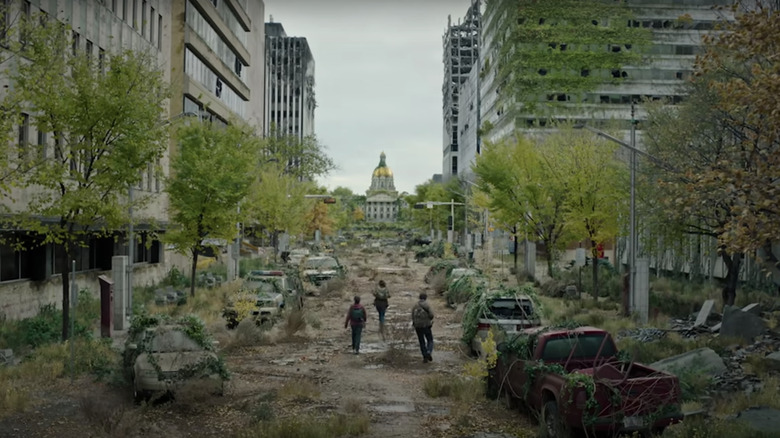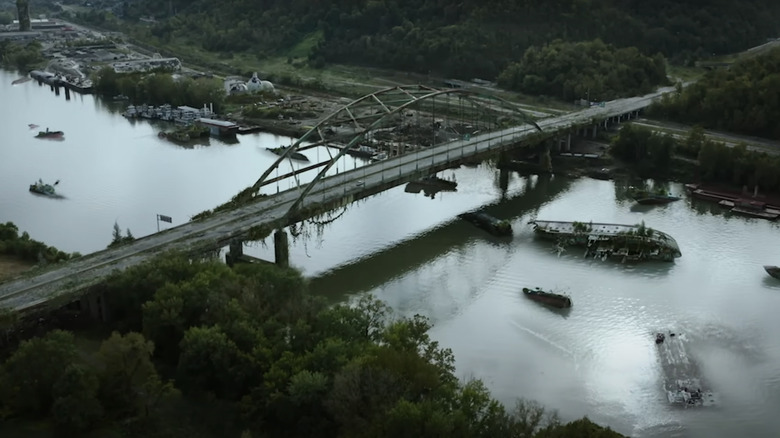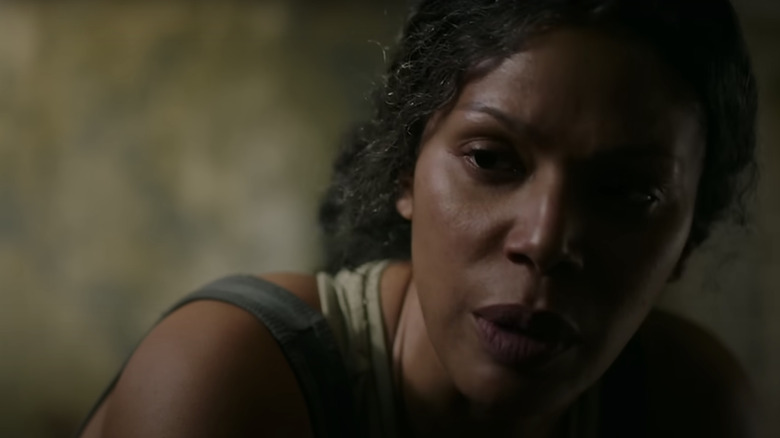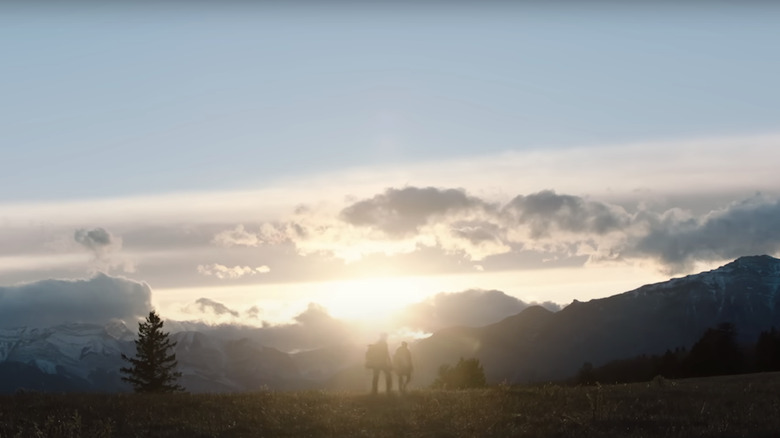What It Was Like To Film HBO's The Last Of Us During An Actual Pandemic
The original version of "The Last of Us" stole the hearts of a whole generation of gamers when it debuted for the PlayStation 3 in 2013. This month, the long-awaited HBO adaptation of the beloved video game will finally arrive. It's an expensive show, promising action and dystopian drama on a grand scale, and it's taking on the Sunday night release slot that many prestige shows have occupied before it.
As it's translated into a new medium, HBO's take on "The Last of Us" is going to frequently diverge from the source material to expand the scope and vision of creator Neil Druckmann's post-apocalyptic America. One key difference between the release of the original game and the new show that's impossible to ignore is its correlation with real-world events. The show was officially greenlit in November 2020, during the heights of our real-life pandemic.
Now, there's a meta layer of subtext that audiences will bring into this story they didn't have before. No, Covid is not a mind-seizing fungal Cordyceps infection, but we've all collectively lived through a moment of traumatic crisis in the few years, and many are still struggling in very real ways. Will HBO's "The Last of Us" reflect or comment on this real-world experience? How has the pandemic informed the creation of this adaptation?
/Film's Ben Pearson was able to attend roundtable interview "The Last of Us," and stars Gabriel Luna and Merle Dandridge opened up about what it was like creating the show in the midst of a real pandemic.
Filmed at the height of the pandemic
Gabriel Luna, who plays Tommy, the younger brother of Pedro Pascal's Joel, admitted that there was definitely a concern about the weight of the subject material, but he remains confident that the somewhat shared experience between the characters and the audience might be a benefit.
"I think what you might worry about is the potential for a fatigue with our audience in dealing with this subject matter that is very fresh in all of our experience," Luna said. "I think that is ultimately going to be the truth of people's experience, is that having this global shared moment in time gives the audience the docking point, gives them the on-ramp to the story, and they know it. They know what it feels like to start to hear murmurs coming from across the globe about this invisible threat."
Luna recalls what shooting "The Last of Us" right in the height of Covid was like, which was always at the forefront of their minds as they tested and walked onto set everyday:
"It could be, might be a little traumatizing for some of us, I think, but it'll help. I think it helps in the processing of what we all went through and that it was ever-present in our minds. I mean, we were shooting during 2021 in the middle of it, had to test, had to always be worried about that. We seemed to be dodging it really well for quite a while. Eventually caught up with us, but you couldn't prepare for that. We'd have to go back a hundred years if this had not happened when it did, and so odd how things seem to be on that hundred years cyclical deal."
Dandridge preferred to separate reality from fiction
Different actors have different philosophies on performance. To that end, Merle Dandridge, who plays the enigmatic rebel leader Marlene, had different opinions on separating real life parallels with her own craft. "Having parallel pandemics in art and in real life could be an obvious connection, but I think for me, it was important to separate them," Dandridge explained. "Because my own personal feelings or traumas and experiences around our pandemic informed Merle differently than this one informs Marlene. The violence with which things were ripped from Marlene and the choices that she made to be very loud about how to shift it."
One slippery slope for the actress was that she didn't want to give into the hopelessness that her character feels in "The Last of Us," which takes place 20 years into the Cordyceps infection and has fully decayed society, leading to an oppressive regime that rules with an iron grip. For Dandridge, it was important to separate the bleak fictional dystopia of Druckmann's creation with the real world, where there is always hope for the future:
"The other big factor is that we had an end in sight. We had a hope for, or actual tangible evidence that this was going to have some kind of long-term stasis. And in the world of 'The Last of Us,' there's no hope of that. There's no knowledge of it. There is only more. There's only more and broader infecting. And then for Marlene to step forward and still very loudly, with a very loud microphone, demand that people believe beyond their circumstances, takes a tremendous amount of courage."
'I think it worked to our advantage'
Whether or not they chose to incorporate their real-world experiences from the pandemic into their performances, the cast of "The Last of Us" are uniquely bonded having quarantined together and filmed a story with such an emotional, existential undercurrent to it during a similar time of isolation and tragedy. Luna feels confident that these feelings will resonate with viewers, while also acknowledging elsewhere in the conversation that the pandemic is a terrible thing that's had devastating consequences:
"But here we are having had that very, very real and very fresh experience of having to come together to face an impending doom. I think it worked to our advantage, as any true life experience does when you're creating art and you can infuse it with true life experience. I think that'll also translate for the audience."
The second entry in "The Last of Us" game series, "The Last of Us Part II,” was released earlier in the pandemic. While there are some criticisms of Druckmann's story and the cynicism attached to it, the game went on to become one of the most praised and successful games on the PlayStation 4. We expect the same for the HBO show, as "The Last of Us" might hit close to home, but it will always find something cathartic and humanistic along the way.
"The Last of Us" premieres on HBO on January 15, 2023.



